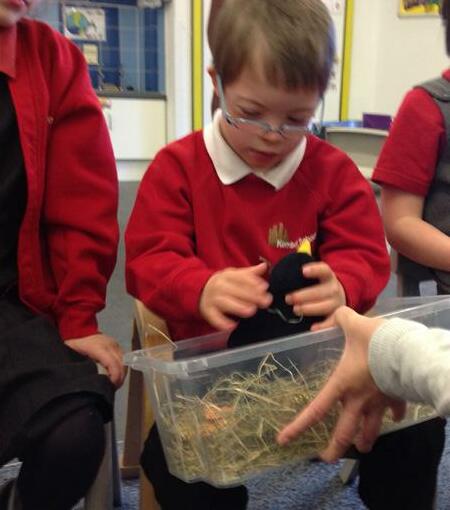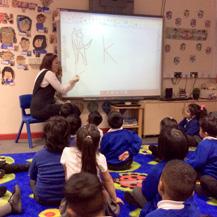
8 minute read
11 English
Abbey Hulton Primary School
• Switch On Reading
Advertisement
Switch-on Reading is a 20 minute, daily, trained-adult led, personalised reading intervention, for children who are vulnerable or underachieving in reading across the primary age range.
It is intended to be run over a 10 week period with the expectation of at least double age related progress. The aim of the intervention is that children are able to participate more fully in the classroom into becoming more confident, active and independent readers, who can use a range of effective reading strategies in order to achieve their full literacy potential.
• Differentiated Texts
Throughout each unit, the links between reading (Whole Class Differentiated Texts) and writing are made explicit – we read as writers and we write as readers. Pupils are immersed in a variety of different text types through the integration of GPS and comprehension activities.
Learning about language in the context of a high quality text, rather than a series of discrete grammar exercises on grammar and punctuation, enables our children to see how language really works and how writers have made specific choices. Pupils are encouraged to read with a writerly eye and curiosity to enable them to digest and internalise that particular style. They also participate in a variety of drama activities to immerse and engage them in the text so that they absorb the language, phrasing, and vocabulary that supports their cognitive development.
The progress throughout each unit of work shows the transition between reading as writers (focusing on structure, characterisation, and language features etc…) to writing as readers (word play, describing, composition, planning, editing, revising etc…).
English
• Guided Reading Through Reading Gems
At Abbey Hulton, we believe the content domains are a list of skills needed to become a fluent and resilient reader.
The teaching of reading should include more than awareness of the skills to get through a reading test; the application of those skills are fundamental to the understanding of what is being read.The reading domains are referred to in child friendly ways called Reading Gems. Using this approach, we choose one domain (retrieval, define, inference, prediction etc) per week to explicitly teach and focus upon, allowing modelling by the teacher and chances to apply throughout the week.
Etruscan Primary School
• Talk For Writing
Writing is taught in a structured way of teaching writing from Nursery up to Year 6, following Pie Corbett’s ‘Talk for Writing’ process. Talk for Writing involves making explicit the processes and thinking involved in the writing process so that ultimately they can be internalised and applied by children in their own writing. The development of key vocabulary is supported throughout the process. Talk for Writing is embedded in every writing lesson throughout the school.
Forest Park Primary School
For phonics at Forest Park, we follow the Read Write Inc programme. Children learn the English alphabetic code: first they learn one way to read the 40+ sounds and blend these sounds into words, then learn to read the same sounds with alternative graphemes. They continue on the programme until they can confidently apply these skills into their reading. We also include our EAL learners (where necessary) on our RWI programme as we find that children learning English as an additional language make speedy progress when learning to read with Read Write Inc. All children are grouped according to their reading progress and re-assessed every half term – they learn sounds and practise reading every day at exactly the right level. Children are taught by staff who have had full and comprehensive training. We also use a coaching model to support staff, which gives weekly coaching sessions to staff members ensuring we are all using the same systematic approach to deliver high quality phonics sessions to every child at Forest Park. We invest a lot of time and resources into teaching reading as we believe that reading is fundamental in unlocking the wider world to our children.
At Forest Park, we teach English reading and writing in years 2-6 through text-based units. We endeavour to use books written by authors from BAME backgrounds to represent the rich cultural diversity of our school. These books are used alongside high quality non-fiction to deliver whole class guided reading through the VIPERS method. This method of teaching reading focuses on the comprehension aspect of reading through the key areas of vocabulary, inference, prediction, explanation, retrieval, summarise and sequence. We believe that developing a love of reading is key to ensuring our children become lifelong readers. We have a well-stocked library that children have the opportunity to visit weekly and our school librarians are fantastic at keeping this running smoothly. Each class also has a class reading area and all classes from nursery to year 6 have some time dedicated each day to reading for pleasure. We also partake in Stoke 100 reads in partnership with our local library. This helps to direct children towards quality texts they should read. The aim is, they read all 100 before leaving primary school.
We aim to create well-rounded writers who can write for a wide range of audiences and purposes. We teach a progressive range of text types covering the areas of entertain, inform, persuade, discuss, instruct and explain through our text-based unit. We use trips, visitors, drama and practical activities to the fullest to provide our children with real-life experience to enrich their writing and create great writers.
Kemball School
• English Phonics
Come and see how English is delivered in a special school setting with a particular focus on how phonics is delivered through a structured, multisensory approach. Observe how we adapt a structured phonics programme to meet the varied needs of our pupils through sensory phonics and a range of variations to teach and embed the early stages of reading and writing. Through observing a range of abilities, you will see how we integrate phonics into the wider curriculum to develop children’s independence in applying their skills of reading and writing.
• Makaton
Makaton is a language programme using signs and symbols to support communication. It is designed to support spoken language and the signs and symbols are used with speech, in spoke word order. We deliver training sessions through the stages and can share materials and resources that we use within the school setting. In addition to the training, you also have the opportunity to see Makaton being used within the school and look through resources to see how this is incorporated into lessons.

English
• Sensory Story
Come and observe the engagement and Multisensory pathway departments to see how EHCP targets and individualised targets are taught and delivered through the sensory story to meet individual pupil needs.
• Communication and Alternative Communication
If you are new to supporting a pupil(s) with a communication need, then come to Kemball and see how we support pupils with a range of communication aids. Examples include PECS, PODD, Communication books, Makaton, Visual timetable, Vocabulary boards, Switches.
Oakhill Primary School
• Whole Class Reading
Whole Class Reading sessions take place from Year 2-6 three times per week. These sessions are planned on a two-week cycle. During week 1, children work on the novel that is being used as a stimulus in their writing lessons. In week 2, children will be exposed to another novel, or extracts of, nonfiction texts and poetry. Reading lesson objectives are taken from the Oakhill Reading Progression document which ensures that objectives are progressive.
Pupils are taught key reading skills during these lessons which include skimming, scanning, authorial choice, critical comparisons etc and they are exposed to a wide variety of texts.
• Opportunities for Speaking and Listening
At Oakhill Primary School, we pride ourselves on furthering the aspirations of children. One way we do this is through our OSAL award - Opportunities for Speaking and Listening. In Key Stage 2, all children participate in an assessment designed to build confidence and prepare them for life in High School and beyond. The children prepare a presentation suited to a particular title, such as “Who inspires me?” or “What interests me?”. This is delivered to the award assessor and a small group of children. The children also perform a poetry recital and a passage of storytelling. The children receive a report sheet and a certificate following their assessment. The OSAL award has helped our children improve their communication skills and increase their confidence.
• Phonics

Phonics is taught following the guidance in Letters and Sounds.
Children receive daily phonics sessions that allow them the opportunity to re-visit previous learning, and practise and apply new learning in a variety of fun, engaging and interactive ways.
St Mark’s Primary School and Etruscan Primary School
• Phonics and Spelling
Both schools teach phonics using the Read Write Inc. phonics programme designed by Ruth Miskin. During phonics lessons, children are taught to read accurately and fluently with good comprehension. They learn to form each letter, spell correctly and compose their ideas step-by-step. This approach has led to pleasing results in the year 1 phonics check in recent years.
Spelling is taught using the Read Write Inc. spelling programme. This is for children in years 2 to 6 who can read accurately, with increasing speed. Children have 15 minutes of daily teaching where they develop confident spelling techniques. The teaching of spelling develops children’s knowledge of word families, how suffixes impact on root words, as well as mnemonics for children to remember the trickiest of spellings.












